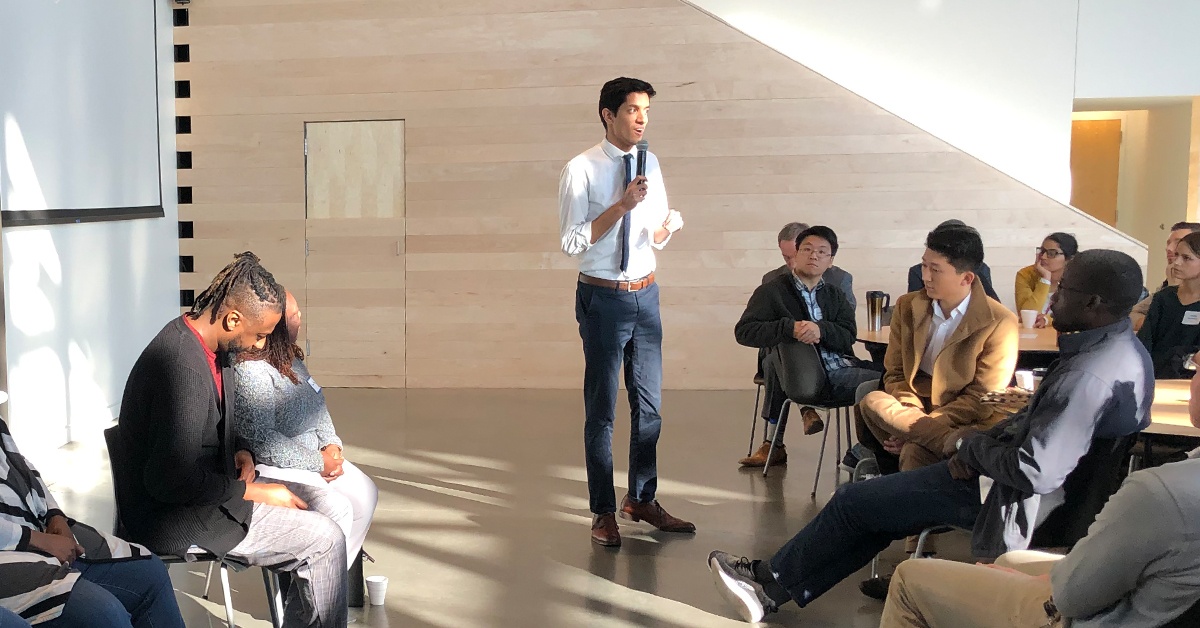Rohan Khazanchi is an MD / MPH Dual Degree student studying Public Health Medicine at the University of Minnesota School of Public Health. As a health disparities researcher and member of the American Medical Association, Rohan has been a staunch advocate for health equity. Read his responses to the questions below to learn more about his experiences as a Dual Degree student.
Why did you choose to pursue a MD/MPH dual degree?
[Rohan] While I am, of course, excited about my future career in medicine, I always knew I wanted to seek public health training to complement my clinical interests. The care I will provide, though important, will likely only determine 10-20% of my future patients’ health outcomes. My dual-degree training has helped me build the humility and confidence to intentionally consider the social and structural forces outside the walls of my clinic which determine the other 80-90% of their health.
If a close friend asked you why you’re studying public health, what would you tell them?
[Rohan] My clinical training to date has been really amazing, but it also left me feeling inadequately equipped to address structural inequities as “just” a clinician. I chose to study public health because I wanted the tools to advance equity-oriented research and help policymakers understand how to embed health and equity into all policies. I believe building these skills will make me a better physician, educator, researcher, and advocate for my patients.
What types of community-oriented public health research have you done in the past?
[Rohan] As part of a longitudinal honors program in Comprehensive HIV Care at my medical school, I led a research study to investigate the influence of structural forces on racial/ethnic disparities among people with HIV. Omaha, Nebraska is among the most racially and economically segregated cities in the U.S., largely due to redlining in the early 20th century. We knew at baseline that Black people with HIV had lower viral suppression rates than white patients at our HIV clinic. However, the difference in viral suppression between Black and white populations was non-significant after controlling for other factors, primarily because poverty and neighborhood deprivation were both independently associated with lower odds of viral suppression. Our findings highlighted that race alone is not associated with worse HIV outcomes, but rather, racism in the form of intergenerational disinvestment in predominantly Black communities explains downstream differences in neighborhood deprivation and HIV outcomes. Working on this study re-emphasized the importance of recognizing how racism operates as a system to inequitably structure the opportunity for good health.
Can you tell me about your involvement in national advocacy through the American Medical Association?
[Rohan] I joined the American Medical Association (AMA) as a first-year medical student, and felt inspired to expand my involvement after meeting brilliant peers from across the country who think critically about systemic issues in U.S. health care. In November 2020, I co-led two resolutions which were adopted by the 600-member AMA House of Delegates (“Racism as a Public Health Threat” and “Racial Essentialism in Medicine”). These new AMA policies will commit America’s largest and most well-resourced physician advocacy group to fight for equitable advancements in local and federal policy, health care delivery, clinical practice, and medical education. Most importantly, our team of authors felt strongly about the need to move beyond performative statements and towards the praxis of anti-racism. To this end, we are glad that the adopted policy includes very specific directives for action, and we know that these are just small steps on the long path to health equity.
How are you helping in the fight against COVID-19?
[Rohan] I have been blessed with amazing mentors for COVID-19-related research since the pandemic’s early stages, with whom I published a commentary on why racism is a fundamental cause of COVID-19 inequities and a study examining county-level social vulnerability and COVID-19 outcomes. I have a few other projects in the works which will hopefully help clinicians, researchers, and policymakers better understand inequities in clinical trial access and health care utilization during the pandemic.
As part of my MPH Applied Practice Experience, I’m also working with Dr. Tyler Winkelman at Hennepin Healthcare’s Health, Homelessness, and Criminal Justice (HHCJ) Lab as a research assistant helping support the MN EHR COVID-19 Consortium. The Consortium is a multi-health system collaborative which aggregates electronic health records data to paint a clearer picture of COVID-19 testing, infections, and hospitalizations statewide. One of the perks of using EHR data is the rapid availability of granular sociodemographic information. At our weekly meetings, we provide health systems and the Minnesota Department of Health with nearly real-time access to population-specific utilization trends, shifting COVID-19 disparities, and more. I have really appreciated the opportunity to learn from these multidisciplinary teams and think critically about prioritizing equity amidst the changing landscape of care delivery.
In what ways is the UMN SPH a good fit for you?
[Rohan] I have really appreciated the flexibility of the Public Health Medicine MPH program, which has allowed me to take classes across multiple public health disciplines. On any given day, I get to think about health economics, biostatistics, policy, sociology, demography, and more—my classes have all been really motivating and interesting. I’m relatively self-directed and love picking up “passion projects” to learn by experience along the way, so this bandwidth has helped tailor my MPH to focus on the exact skills I need.

